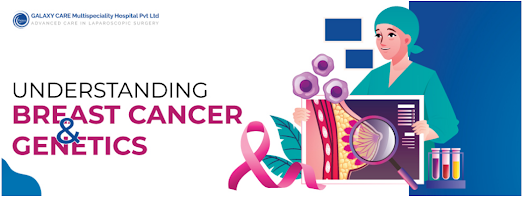BREAST CANCER AND GENETICS: UNDERSTANDING HEREDITARY RISK FACTORS
At Galaxy Care Hospital, we have the Best Breast Cancer Specialist in Pune. We understand that breast cancer prevention begins with awareness. Genetics are considered one of the key risk factors of breast cancer. In this blog, we will explore the genetics of breast cancer and understand the hereditary risk factors associated with abnormal genes.
COMMON GENETIC MUTATIONS LINKED TO BREAST CANCER
The two most common genes linked to hereditary breast cancer are BRCA1 and BRCA2. These genes normally help repair damaged DNA and regulate cell growth. However, mutations in these genes impair their function and increase cancer risk. BRCA1 and BRCA2 mutations may account for up to 10% of all breast cancers.
Women with a BRCA1 mutation have up to a 70% risk of developing breast cancer in their lifetime. For BRCA2, the risk is around 40-60%. Cancers associated with these mutations often occur at a younger age and in both breasts. Additionally, BRCA mutations also increase the risk of ovarian, prostate and other cancers.
OTHER GENES ASSOCIATED WITH INCREASED RISK
Besides BRCA1/2, mutations in other rare genes have also been linked to higher breast cancer risk:
- PALB2: Estimated lifetime risk with a mutation is around 35%.
- TP53: Causes Li-Fraumeni syndrome. Lifetime breast cancer risk is around 54%.
- ATM: Estimated lifetime risk is 33-38% depending on the mutation.
- CHEK2: Can double lifetime risk. Estimated at 28-37% with a family history.
These genes normally help repair DNA damage. Mutations impair this function and allow breast cells to accumulate DNA errors over time, leading to cancer.
ASSESSING FAMILY HISTORY AND GENETIC RISK
A person’s risk is higher if they have a strong family history of breast cancer characterized by:
- Relatives diagnosed before age 50
- Multiple family members affected on the same side
- Combination of breast and ovarian cancers
- Ashkenazi Jewish heritage
- Triple-negative breast cancer in the family
In such cases, genetic testing can help identify if an inherited mutation is present. This provides clarity on cancer risks and screening/prevention options. Consult the Best Breast Cancer Specialist in Pune for timely intervention.
REDUCING RISK FOR THOSE WITH HEREDITARY MUTATIONS
For individuals found to have BRCA1/2 or other high-risk mutations, certain options may be considered to lower cancer probability:
- Increased surveillance with annual mammograms and MRIs from a younger age.
- Preventive medication can reduce risk by 50% in high-risk women.
Making lifestyle changes like maintaining a healthy weight and avoiding smoking are also important. Close monitoring is still needed after any preventive procedures as a small risk remains.
CONCLUSION
In conclusion, genetics play an important role in hereditary breast cancer risk. Abnormal BRCA1, BRCA2 and other high-risk genes can substantially increase lifetime odds. For those with a strong family history, genetic testing helps gauge personal probabilities and guide prevention strategies. At Galaxy Care Hospital, the Best Cancer Hospital in Pune, expert Breast Cancer Specialists analyze family histories during regular breast cancer screening and may recommend conducting specialized genetic testing. If you want to take preventive steps for breast cancer, choose Galaxy Care Hospital We offer state-of-the-art facilities, advanced screening, counselling, and treatment options for individuals facing heightened risks of breast cancer or those diagnosed. Feel free to get in touch with us for the Best Cancer Treatment in Pune. We are here to help!



Comments
Post a Comment